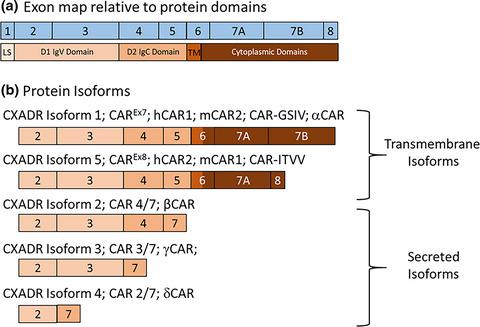当前位置:
X-MOL 学术
›
FEBS Lett.
›
论文详情
Our official English website, www.x-mol.net, welcomes your
feedback! (Note: you will need to create a separate account there.)
The Coxsackievirus and Adenovirus Receptor: Virological and Biological Beauty
FEBS Letters ( IF 3.0 ) Pub Date : 2020-05-09 , DOI: 10.1002/1873-3468.13794 Katherine J D A Excoffon 1, 2
FEBS Letters ( IF 3.0 ) Pub Date : 2020-05-09 , DOI: 10.1002/1873-3468.13794 Katherine J D A Excoffon 1, 2
Affiliation

|
The coxsackievirus and adenovirus receptor (CAR) is an essential multifunctional cellular protein that is only beginning to be understood. CAR serves as a receptor for many adenoviruses, human group B coxsackieviruses, swine vesicular disease virus, and possibly other viruses. While named for its function as a viral receptor, CAR is also involved in cell adhesion, immune cell activation, synaptic transmission, and signaling. Knockout mouse models were first to identify some of these biological functions; however, tissue‐specific model systems have shed light on the complexity of different CAR isoforms and their specific activities. Many of these functions are mediated by the large number of interacting proteins described so far, and several new putative interactions have recently been discovered. As antiviral and gene therapy strategies that target CAR continue to emerge, future work poised to understand the biological implications of manipulating CAR in vivo is critical.
中文翻译:

柯萨奇病毒和腺病毒受体:病毒学和生物学之美
柯萨奇病毒和腺病毒受体 (CAR) 是一种必需的多功能细胞蛋白,人们才刚刚开始了解它。CAR 可作为许多腺病毒、人类 B 组柯萨奇病毒、猪水疱病病毒和其他病毒的受体。虽然因其作为病毒受体的功能而得名,但 CAR 还参与细胞粘附、免疫细胞激活、突触传递和信号传导。基因敲除小鼠模型首先确定了其中一些生物学功能;然而,组织特异性模型系统揭示了不同 CAR 亚型的复杂性及其特定活性。许多这些功能是由迄今为止描述的大量相互作用蛋白质介导的,并且最近发现了几种新的假定相互作用。
更新日期:2020-05-09
中文翻译:

柯萨奇病毒和腺病毒受体:病毒学和生物学之美
柯萨奇病毒和腺病毒受体 (CAR) 是一种必需的多功能细胞蛋白,人们才刚刚开始了解它。CAR 可作为许多腺病毒、人类 B 组柯萨奇病毒、猪水疱病病毒和其他病毒的受体。虽然因其作为病毒受体的功能而得名,但 CAR 还参与细胞粘附、免疫细胞激活、突触传递和信号传导。基因敲除小鼠模型首先确定了其中一些生物学功能;然而,组织特异性模型系统揭示了不同 CAR 亚型的复杂性及其特定活性。许多这些功能是由迄今为止描述的大量相互作用蛋白质介导的,并且最近发现了几种新的假定相互作用。











































 京公网安备 11010802027423号
京公网安备 11010802027423号